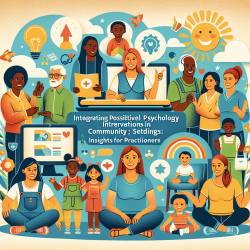Introduction
In the realm of speech-language pathology and early childhood development, data-driven decisions are pivotal in shaping successful outcomes. A recent study titled "Early care and support for young children with developmental disabilities and their caregivers in Uganda: The Baby Ubuntu feasibility trial" provides a wealth of insights into the potential impact of early intervention programs. This blog explores how practitioners can leverage these findings to enhance their skills and improve outcomes for children with developmental disabilities.
The Baby Ubuntu Program: A Beacon of Hope
The Baby Ubuntu program, a community-based, participatory initiative, was designed to provide early care and support for young children with developmental disabilities in Uganda. The program's feasibility and acceptability were evaluated through a pilot trial involving 126 infants and their caregivers. The findings revealed that the program was both feasible and acceptable, with high levels of participation and engagement from caregivers and healthcare workers.
Key Findings and Implications for Practitioners
The trial demonstrated several key outcomes that practitioners can utilize to refine their approaches:
- Community Engagement: The success of the Baby Ubuntu program was largely attributed to community sensitization and the involvement of local champions. Practitioners should consider integrating community engagement strategies into their interventions to foster a supportive environment for children and families.
- Peer Support: The participatory approach of the program, which included peer support from other caregivers, was a significant enabler. Encouraging peer support networks can enhance caregiver confidence and reduce feelings of isolation.
- Addressing Stigma: Despite the program's success, barriers such as stigma and exclusion persisted. Practitioners must actively work to combat stigma through education and advocacy, promoting inclusive attitudes towards children with disabilities.
- Cost-Effectiveness: The program's cost per participant was found to be USD 232, indicating financial sustainability. Practitioners should explore cost-effective models to ensure the scalability of interventions.
Encouraging Further Research
While the Baby Ubuntu trial provided valuable insights, it also highlighted areas for further research. The inconclusive impact on scored family quality of life suggests a need for more comprehensive evaluations of intervention outcomes. Practitioners are encouraged to engage in research initiatives that explore the long-term effects of early intervention programs, particularly in low-income settings.
Conclusion
The Baby Ubuntu feasibility trial underscores the transformative potential of early care and support programs for children with developmental disabilities. By embracing community engagement, fostering peer support, and addressing stigma, practitioners can create meaningful change in the lives of children and their families. As we continue to learn from data-driven research, the future of early intervention looks promising.
To read the original research paper, please follow this link: Early care and support for young children with developmental disabilities and their caregivers in Uganda: The Baby Ubuntu feasibility trial.










